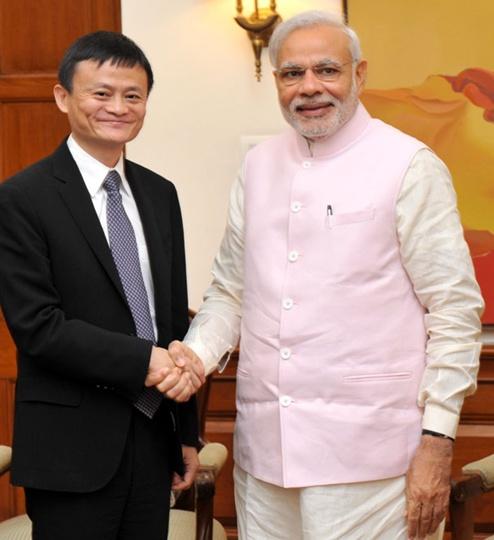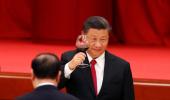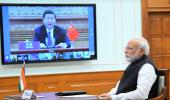Alibaba's pervasive economic and social influence in China is seen as a threat to the authority of the Chinese Communist party, notes Shyam Saran.

The annual Central Economic Work Conference of the Chinese Communist party was held from December 16-18, 2020. It gives broad indication of how China assesses its current economic situation and its priorities in the current year.
2021 is specially significant as it marks the 100th anniversary of the founding of the Chinese Communist party.
It is also the first year of the 14th Five-Year Plan, which must take into account not only the challenge of recovery from the adverse impact of the COVID-19 pandemic, but also of confronting a deeply uncertain outlook and likely turbulence in the external political and economic environment.
Behind the somewhat boilerplate pronouncements, there are clear indications of what the Chinese leadership sees as strengths and vulnerabilities in the new year and beyond.
The Central Economic Work Conference report lays out what has become the catch-phrase for current economic strategy 'dual circulation' which stands for a domestic demand-led and an export and investment-led economy. These are mutually reinforcing in an ideal situation.
But the Central Economic Work Conference suggests that in the current external uncertainty prevailing, a new development paradigm must take domestic circulation as the 'main entity'.
The key role of State-owned enterprises will be further strengthened and they would be in the lead in 'strengthening national strategic technologies' and in promoting innovation. National strategic technologies are those which are critical to national security and include artificial intelligence, semiconductors and components in a range of high-tech industries.
National security is a key consideration in another focus area, that of strengthening the State's 'independent ability' to control industrial supply chains. Instead of being only a link in extended supply chains, led and controlled by foreign entities, China would like to lead such supply chains itself.
Instead of being vulnerable to disruptions that may be caused by its economic partners, it would like to be in a position where interdependencies implied in supply chains could be used to advance China's security interests. Xi Jinping has stated in another context that China ought to be able to use economic links to impose political costs on its partners. It is doing so with its punitive trade measures against Australia.
This strategy of 'weaponising'economic interdependency should be clearly understood and confronted.
Another new element relates to 'anti-monopoly suppression' and 'prevention of disorderly capital expansion'. This is directed towards Chinese private corporate sector and is the reverse side of promoting State-owned enterprises champions.
This policy should be seen in the light of regulatory scrutiny and action being taken against highly successful multinational high-tech firms like Alibaba and Tencent. Their rapid expansion and pervasive economic and social influence in China is being seen as a threat to the authority of the Chinese Communist party.
Alibaba's foray into fintech beyond its payments business is seen as a rival to the Chinese State's plans to introduce a sovereign digital currency and a national payment system with Chinese banks as intermediaries.
There may be concerns about financial stability, the argument being that these private high-tech conglomerates may have become 'too big to fail', but political factors are more important.
The message is clear: China's private sector must operate under Chinese Communist party leadership and supervision.
Thus, in whatever deals may be contracted by a foreign enterprise with a Chinese private entity, the Chinese state and more precisely, the Chinese Communist party is also an interested party.
Heightened security concerns are also evident in another priority area identified by the Central Economic Work Conference, which is food security and the state of agriculture generally. China has achieved impressive increases in agricultural production but is also one of the largest importers of foodgrains and other agricultural products such as soyabeans. It is also a major importer of beef, pork and poultry.
Since 2014, its imports of grains have averaged over 100 million tonnes annually and during 2020, they went up by about 30 per cent over the 2019 imports. Despite stable prices generally, food inflation has become a worry.
Pork prices, which are especially sensitive, have gone up significantly due to a shortage of supplies resulting from the African swine flu epidemic. China also faces a problem of declining arable land as a consequence of rapid urbanisation, land erosion and declining fertility.
It is, therefore, no surprise that food security has been included in the list of priority areas. Yields are sought to be increased through improved seeds and further genetic research. There is a focus on creating much larger grain storage capacity and in preventing further loss of arable land. A 'red line' of 120 million hectares has been cited as the minimum acreage that must be maintained to ensure food security.
Some other focus areas are carried over from earlier policy pronouncements. These include reaffirmation of China's climate change related commitments. Also, the promotion of domestic demand and enhancing the proportion of gross domestic product derived from consumption in particular through provision of public services such as health and education.
However, there is no indication that the government is going to deploy significant economic stimulus measures to achieve higher domestic demand. The focus is on 'stable fiscal policy and prudent monetary policy'.
There is legitimate satisfaction over China being the only large economy that is likely to record a positive GDP growth rate of 2 per cent for 2020 and a forecast of 8 per cent over 2021. This provides a cushion no other major economy enjoys.
China has also defied expectations that it will suffer from supply chain disruptions and possible shift of these chains away from China. If anything, reliance on China to keep such chains operational seems to have increased, certainly with respect to East and Southeast Asia.
China's success in becoming a partner in the Regional Comprehensive Economic Partnership and its continuing promotion of its ambitious Belt and Road Initiative are likely to reinforce its role as an engine of growth both in Asia and the world.
The Central Economic Work Conference also reaffirmed China's intention of seeking membership of the Comprehensive and Progressive Agreement for Trans-Pacific Partnership.
The new year finds India on the very margins of an Asian economic space dominated by China. Atmanirbhar Bharat must deal with this inescapable reality.
Shyam Saran is a former foreign secretary and a senior fellow, Centre for Policy Research, a New Delhi-based think-tank.











 © 2025
© 2025